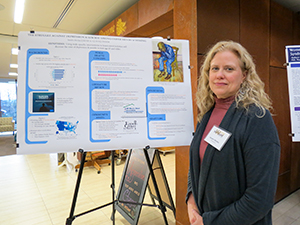
Contact Us
Institutional Communications
Bureau of Mines Building, Room 137
Laramie, WY 82071
Phone: (307) 766-2929
Email: cbaldwin@uwyo.edu
WWAMI Medical Student Compares Seattle to Laramie for Outcomes in Medical Education
Published November 25, 2019

Sandra Ritchie, a second-year medical student, stands next to her poster during the
WWAMI Research Symposium Nov. 7 at Ivinson Memorial Hospital. (Wyoming WWAMI Photo)
Wyoming WWAMI is Wyoming’s medical school, based at the University of Wyoming.
While the curriculum of WWAMI (Washington, Wyoming, Alaska, Montana and Idaho) is advertised as being identical at each of the partnering states’ campuses, students and stakeholders of the program can’t help but wonder what things are unique to each site -- both positive and negative.
In terms of patient populations, Seattle students have exposure to cases drawing from a population that is close to 750,000 people, compared to just under 35,000 residents of Laramie. Recently, Seattle WWAMI student Sandra Ritchie experienced both anatomy lab and classroom medical instruction in Laramie.
During July, Ritchie participated in the University of Washington School of Medicine’s Rural/Underserved Opportunities Program (RUOP) in Laramie. RUOP pairs medical students with physicians in rural and/or underserved communities to allow the students to gain a better understanding of what their practices would involve in such a setting.
Ritchie’s RUOP took place at Ivinson Memorial Hospital in Laramie, where she worked with Dr. Emma Bjore. While the setting is not necessarily rural, patients often arrive at the hospital from remote locations throughout Wyoming.
“I had a really great experience working in Ivinson’s geriatric clinic with Dr. Emma Bjore,” Ritchie says. “I participated in her clinic each day -- sometimes shadowing but often seeing patients on my own. I also was able to perform procedures and physical exams regularly. We also visited different settings in the community, including assisted living facilities, nursing homes, hospice centers and home visits.”
In gaining a better understanding of the importance of getting to know a patient, especially one who may have traveled a distance to see a physician, Ritchie notes the extra level of personal attention patients received during their visits with Bjore.
“The relationships Dr. Bjore builds with her patients are important. She treats each of them with sensitivity and genuine caring. Honestly, she treats them like family,” Ritchie says. “I also could really feel the ‘sense of community’ that is not often apparent in Seattle. Whether it was attending Jubilee Days events or volunteering at the Laramie Downtown Clinic, I saw so much friendliness -- even camaraderie -- among staff, patients and Laramie community members.”
Ritchie says her experience in Laramie changed her career path.
“Honestly, my RUOP experience has changed the direction I was planning for my future,” she says. “Because of my experiences in Laramie, I can really see myself practicing medicine in a smaller city or possibly even a truly rural setting.”
All medical students are required to complete research during their time in the program. Most students participate in research projects or RUOP experiences during the summer between their first and second years of medical school. Students are required to present their summer projects in the form of poster presentations.
The Wyoming WWAMI program partnered with Ivinson Memorial Hospital and its foundation for this year’s WWAMI Research Symposium Nov. 7. Ritchie was invited to spend the week of Nov. 4 in classes with the Wyoming WWAMI students and to present her RUOP poster at the Laramie event.
Ritchie compares classes on the University of Wyoming campus to those at the University of Washington School of Medicine in Seattle.
“A similarity between classes in Laramie and classes in Seattle is that the lecturers were very knowledgeable and well prepared,” she says. “They also seemed to truly care about whether we were really understanding the material and took the time to ensure we were. Also, the scheduling and access to materials were equally organized and accessible.”
Something unique about attending classes on a smaller campus -- such as the University of Wyoming -- is often in the familiarity between students and faculty.
“The Wyoming WWAMI lecturers and staff were very approachable and seemed to really care about building relationships with all of the Wyoming WWAMI students,” Ritchie says. “I also was really impressed by the relationships among all of the students in the Wyoming cohort and their level of commitment to rural medicine. It opened my eyes to the challenges and rewards of practicing medicine in a more rural setting.”
“The WWAMI program is truly a one-of-a-kind program that allows medical students to train in some of the most rural communities in the U.S. while, at the same time, affording students the opportunity to be trained in a large academic medical center in Seattle,” says Tim Robinson, Wyoming WWAMI director. “The volume and acuity of cases in Seattle are things that cannot be reproduced in rural states like Wyoming.
“As Sandra notes about Dr. Bjore, we have outstanding physician instructors in Wyoming, and we are very thankful for the time that these physicians invest into WWAMI students. Nearly 70 percent of Wyoming WWAMI students end up coming back and practicing in our great state. An additional benefit of WWAMI to Wyoming is that we get students like Sandra who experience what our state has to offer and, then, many of these non-Wyoming WWAMI students end up practicing in Wyoming as well,” Robinson says.
“I wholeheartedly recommend my Wyoming WWAMI adventures to other medical students,” Ritchie says. “Experiencing the practice of medicine in a smaller town or rural area will expose them to yet another diverse medical setting and a different culture of patients and people. This exposure will help us to better understand the perspectives of the vast array of patients we will be treating someday. It also may open their eyes to the many rewards of practicing small-town medicine.”
Contact Us
Institutional Communications
Bureau of Mines Building, Room 137
Laramie, WY 82071
Phone: (307) 766-2929
Email: cbaldwin@uwyo.edu
